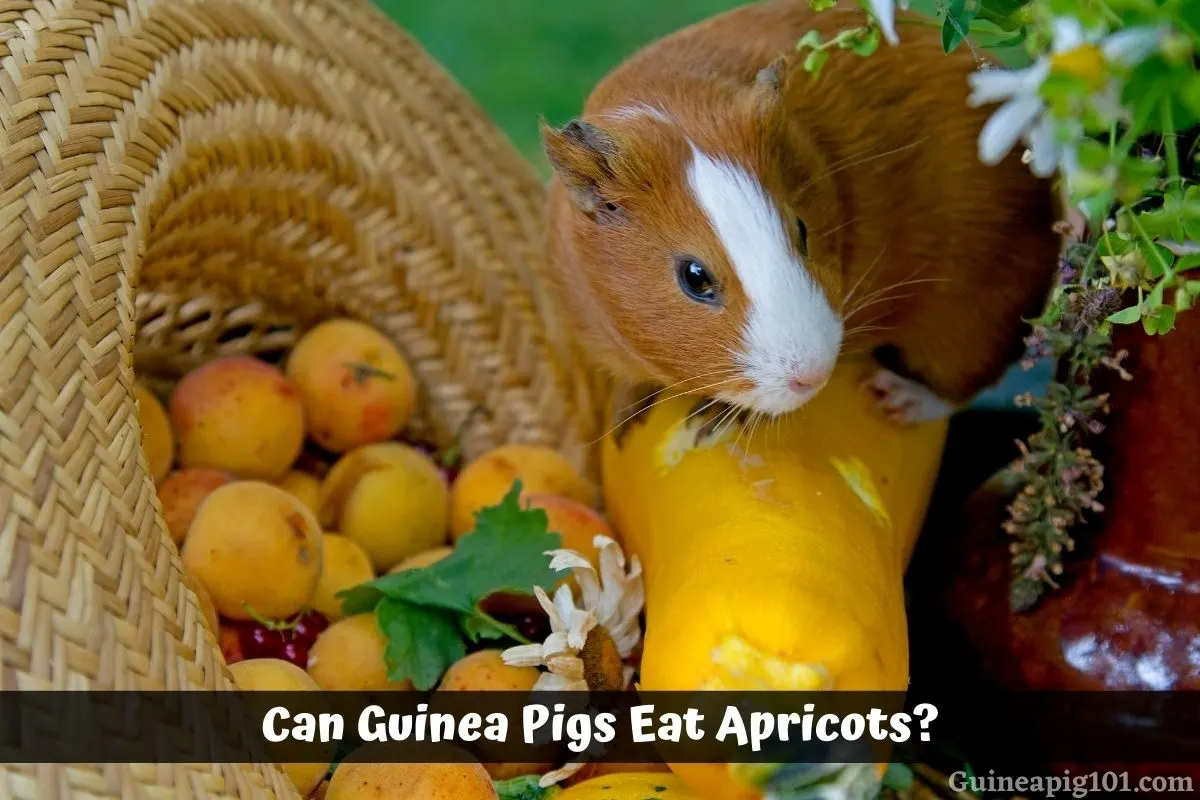Apricots, also known as Armenian plums, is a fruit packed with High Fiber, Vitamins, and Minerals needed by the body. It possesses a lot of benefits for humans, but how good are apricots for our guinea pigs? Can Guinea Pigs Eat Apricots?
Yes, guinea pigs can eat apricots for sure. Apricots are packed with Vitamins, Minerals, Fiber & Antioxidants, which makes it an excellent snack for our guinea pigs. However, it contains a decent amount of sugar in it. Thus, moderate serving is recommended.
Apricots contain a decent amount of Vitamins and Minerals needed by our guinea pigs.
However, Feeding excess amounts of sugar to your guinea pig can be a terrible idea.
High sugar in their diet can lead to obesity, diabetes, and other health issues in our guinea pigs.
Thus, make sure you serve apricots in small quantities only.
So, now that you know you can feed apricots to your guinea pigs, you might be wondering how much apricot should you feed?
How often can you feed it, and what are the hazards you should be aware of?
Don’t worry. We have everything covered for you. Just read the article till the end to learn the benefits, hazards, serving size, and preparation of apricot for your guinea pigs.
Nutrition in apricots
Source: USDA National Nutrient database
| Nutrients | Amount |
|---|---|
| Vitamin C | 10 mg/ 100 g |
| Vitamin K | 3.3 µg/100 g |
| Vitamin A | 96 µg/ 100 g |
| Carotene | 1094 µg/ 100 g |
| Lutein + Zeaxanthin | 89 µg/ 100 g |
| Calcium | 13 mg/ 100 g |
| Phosphorous | 23 mg/ 100 g |
| Potassium | 259 mg/ 100 g |
| Fiber | 2 g/ 100 g |
| Sugar | 9.24 g/ 100 g |
| Magnesium | 10 mg/ 100 g |
| Carbs | 11.12 g/ 100 g |
| Calories | 48 Kcal |
| Fat | 0.39 g/ 100 g |
| Water | 86.35 g/ 100 g |
Apricots are rich in a wide variety of Vitamins and Minerals. However, some of the most common and essential nutrients are as follows:
- High Flavonoid and Anthocyanin: Apricots are a rich source of Flavonoid and Anthocyanin that helps the body fight back diseases, prevent allergies, and also helps in reducing inflammation. These antioxidants also help in lowering blood pressure and prevent cardiovascular diseases. Studies also claim that certain flavonoids help in preventing cancer in the body.
- Vitamin A & Carotene: Apricots are also a rich source of Vitamin A and Beta Carotene. Vitamin A is an essential vitamin for the body. These nutrients help in maintaining good vision, Promotes healthy growth of hair & also aids the immune system of the body.
- Vitamin C: Apricots also contain some Vitamin C in it. It is an essential vitamin for the body as it helps in maintaining a robust immune system, helps fight back diseases, and prevents diseases like scurvy.
- Fiber: Apricots also contain a decent amount of fiber in it. It is an essential nutrient as it aids our digestive system and helps in regular bowel movement in the body. It also helps in maintaining glucose and cholesterol level in the body.
- Potassium: Potassium is yet another essential nutrient present in apricots. The body needs it to maintain fluid balance in the body. It also helps in muscle contraction and regulates nerve signals. Studies have found that a high potassium diet can help prevent kidney and bladder stones.
Are apricots safe for guinea pigs? Hazards?
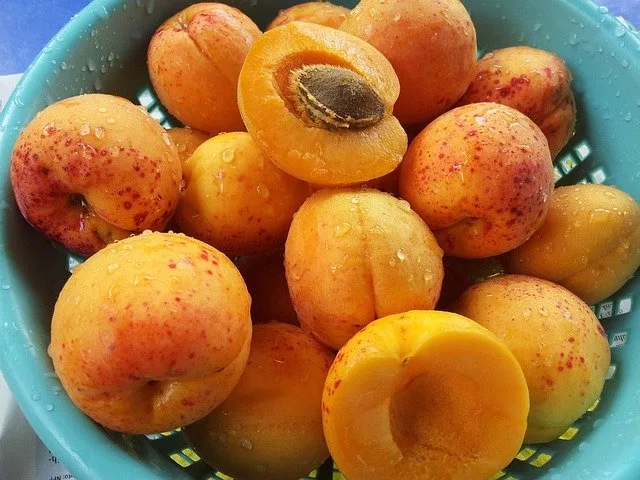
Yes, apricots are entirely safe for our guinea pigs if fed in moderation. Apricots contain a decent amount of Vitamins, Minerals & Anti-Oxidants needed by our guinea pigs.
However, it also includes a lot of natural sugar that can harm our guinea pigs if fed in excess.
Here is some primary health concern to look out for if you are feeding excess apricots to your guinea pigs.
Obesity
Just like human beings, obesity is the root cause of various other diseases in guinea pigs.
Guinea pigs can develop a lot of other diseases if they are obese, and a high-calorie diet is the major contributing factor towards obesity in guinea pigs.
Aim a low sugar diet that includes a cup of fresh veggies and lots of hay for your guinea pigs daily.
Diabetes
Diabetes is yet another common health issue diagnosed among guinea pigs. The root cause of diabetes is a high-calorie diet.
Studies have found that adding fruits and treats continually on the diet of your guinea pigs can make them more vulnerable to diabetes.
Thus, make sure you look out for the serving size of the same.
Diarrhea
Diarrhea is yet another common health problem in guinea pigs. It mostly occurs due to two reason that includes:
- A frequent or significant change in diet
- Overfeeding fruits and treats
Thus, you must always make sure you feed fruits and treats in small quantities and never feed more than recommended serving of the food as it can do more harm than good to your guinea pigs.
Are apricots good for guinea pigs? Benefits?
Yes, apricots make for a perfect snack for our guinea pigs. However, you should ensure to serve the right quantity to ensure your guinea pigs get all the benefits without any adverse effect from the same.
Here are some benefits of feeding apricots to your guinea pigs:
Prevents diseases
Apricots contain a decent amount of Vitamin C and Anti-oxidants that are needed by our guinea pigs.
These nutrients are required by the body to fight back diseases and maintain a healthy and robust immune system.
Promotes eye health
Apricots also contain a lot of Vitamin A and Beta Carotene that helps promote good vision.
Guinea pigs have degenerating eyesight that needs some support in the form of nutrients to maintain good eyesight for an extended period.
Thus make sure you add fruits like Apricots, Apple, Oranges, Strawberries, Papaya, Etc that have the right nutrients to promote our guinea pig’s eyesight.
Reduces Inflammation
The anti-oxidants present in apricots includes Anthocyanins, which is a compound that can help reduce inflammation in guinea pigs.
Guinea pigs are prone to diseases like scurvy, joint swelling, and other similar ailments that can be prevented by feeding the right balance of nutrients to them.
Adding fruits like apricots, cherries, etc. that contain this enzyme can be of great help for them.
Hydrates the body
Apricots and other fruits are rich in water that can help keep our guinea pigs hydrated throughout the summer heat.
As you guys know, not every guinea pigs drink enough water their body needs so, adding some fruits and vegetables is crucial to keep their body hydrated.
How often can guinea pigs eat apricots?

Guinea pigs can eat apricots 1-2 times a week at most. Try to serve apricots more like a snack and never make it a part of their daily diet.
The high sugar content in apricots can be terrible for your guinea pig’s health. Also, make sure you space out the serving throughout the week.
Never feed apricots on two consecutive days to your guinea pigs. For example, if you feed once on Monday, then the next feeding should not be before Thursday.
It is recommended to serve cherries just as a treat and follow it with veggies like lettuce, bell peppers, cucumber, zucchini, carrots, etc. to create a healthy and balanced diet for your guinea pigs.
How many apricots can guinea pigs eat?

Guinea pigs should not be fed more than one slice of apricot at a time. Apricot contains a decent amount of sugar in it, and guinea pigs can’t digest sugar well.
Thus, overfeeding a diet that includes a lot of sugar can be bad for your guinea pig’s health.
You must always remember that fruits are more like a snack for our guinea pigs. It should never be a vital part of your guinea pig’s diet.
Hay and a cup of fresh veggies are what you need to feed your guinea pigs daily to make sure they get a balance of all the nutrients they need.
Can guinea pigs eat apricot with seeds?
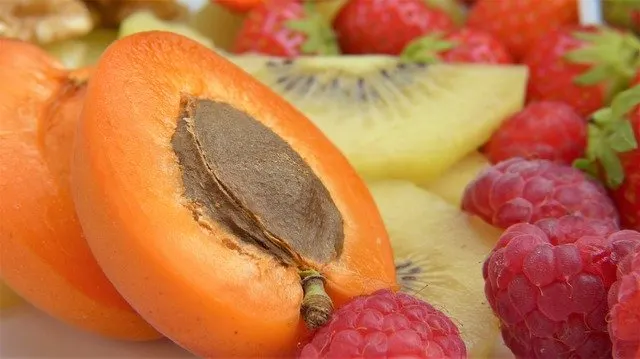
No, guinea pigs cannot eat apricot seeds as it can be fatal for your guinea pig’s health.
The seeds of apricots are hard and tough to crack, and if somehow guinea pigs can break the seed, then it may lead to cyanide poisoning in guinea pigs.
The seeds of apricots contain traces of cyanide in it that are terrible for your guinea pig’s health.
Can guinea pigs eat dried apricots?
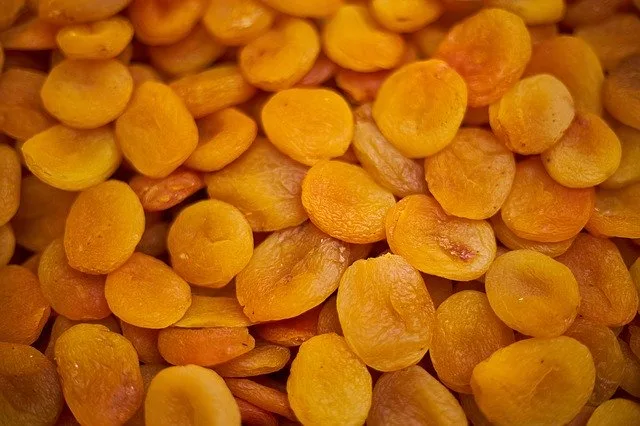
No, guinea pigs cannot eat dried apricots as it is terrible for their health.
According to USDA, dried apricots contain five times more sugar than fresh apricots.
And as we had discussed earlier, sugar is not suitable for the digestive system of your guinea pigs.
It can also lead to various other health issues; thus you should not serve dried apricots to your guinea pigs.
Can guinea pigs eat canned apricots?
No, guinea pigs cannot eat canned apricots at all.
Studies claim that canning fruits contain extra additive color, preservatives, sugar or salt, and various other ingredients that are bad for our guinea pig’s health.
Thus, make sure you only serve fresh apricots to your guinea pigs.
Can guinea pigs eat frozen apricots?
Yes, guinea pigs can eat frozen apricots, but only when it is thawed and brought to room temperature before serving it to your guinea pigs.
Serving frozen fruits or vegetables to your guinea pigs can off-set their digestive system that can be terrible for their health.
Thus you should always make sure you bring the frozen apricot to room temperature by thawing it and then serve the same to your guinea pigs.
Can guinea pigs have apricot juice?
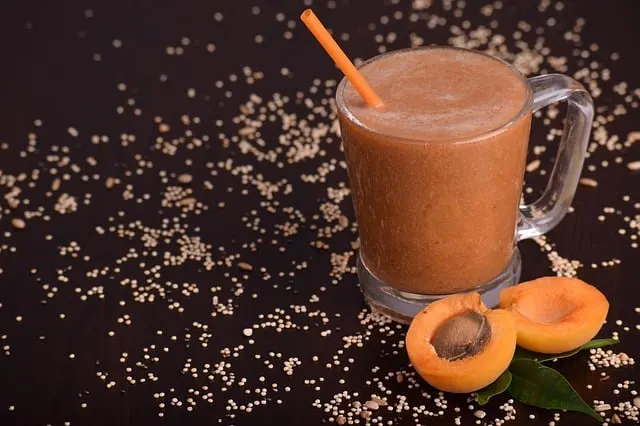
No, guinea pigs cannot have apricot juice at all.
The readymade apricot juice available in the market contains added color, preservatives, and stabilizers that are bad for your guinea pig’s health.
Even if you go for fresh juice, it is going to content way more sugar than what is recommended for our guinea pigs.
Thus, make sure you avoid serving juice.
Can guinea pigs eat apricot tree leaves?
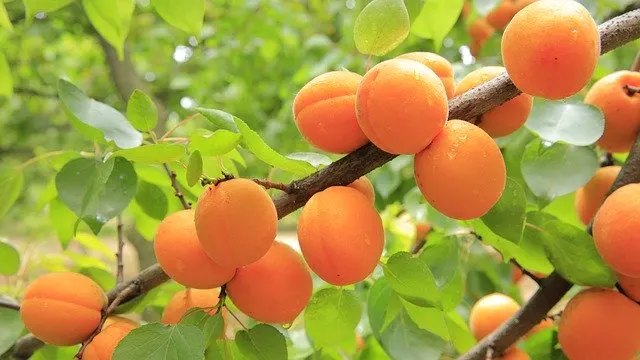
No, guinea pigs cannot eat apricot tree leaves as it is poisonous for our guinea pigs.
The leaves of apricot trees contain traces of cyanide that are fatal for our guinea pig’s health. Thus, it is best to avoid it at all costs.
How to prepare an apricot for your cavies?
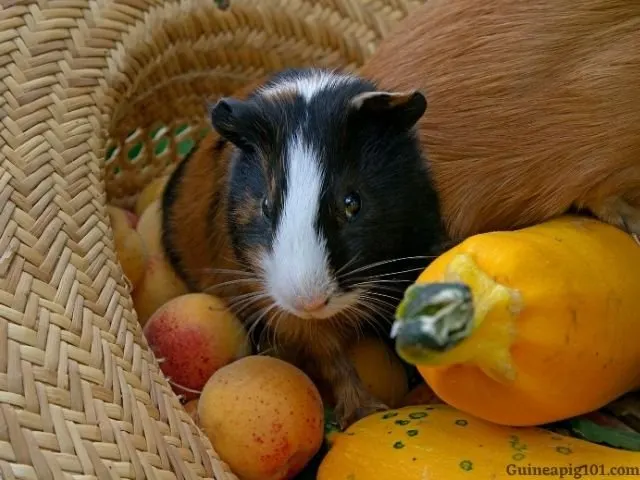
Preparing apricot for your guinea pigs is quite simple and straightforward. Here are the simple steps you can follow to prepare apricot for your guinea pigs:
- Pick a ripe apricot for your guinea pig. The apricot you choose must be yellowish-orange in color and should feel a little soft from outside but firm from the core.
- The second step is to wash the apricot properly to ensure any dirt or chemical attached can get washed away.
- The third step is to cut a small slice and make sure you remove the seed and don’t serve it to your guinea pigs.
- The fourth step is to feed your guinea pigs with this delicious treat. Either you can handfeed the apricot or serve it alongside fresh veggies to your guinea pigs.
- Lastly, you need to remove any uneaten fruits or vegetables from the cage to avoid fly and rats infestation in the cage.
Conclusion: Guinea pigs and Apricot
- Apricots are a rich source of Vitamin A, Vitamin C & Other Antioxidants needed by our guinea pigs.
- Can Guinea Pigs Eat Apricots? Yes, guinea pigs can eat apricots but only as an occasional treat.
- It would be best if you only fed a slice of apricot to your guinea pig at a time.
- Never feed guinea pigs with apricots for more than 1-2 times a week.
- Overfeeding apricots to your guinea pigs can lead to severe health issues, including Obesity, Diarrhea & Diabetes.
- Avoid feeding seeds, leaves, and Branches of apricots to your guinea pigs.
- Always remember the staple part of the guinea pig’s diet is hay and a small portion of fresh veggies. Fruits are only supplements or snacks that you should be serving once in a while.
Related question:
Can skinny pigs eat apricots?
Yes, skinny pigs can eat apricots but only as a snack. Apricots and other fruits contain a decent amount of sugar in it and must be fed sparsely to your guinea pigs.
What fruit can you feed guinea pigs?
There are a variety of fruits that you can offer to your guinea pigs. Some of the most popular fruits for your guinea pigs are:
- Apple
- Orange
- Banana
- Mango
- Pears
- Peaches
- Watermelon
- Kiwi
- Blueberries
- Strawberries
- Grapes
- Cantaloupe
- Pineapple
- Pomegranate, Etc.
Sources: Apricots Nutrition Facts, Health and Nutrition Benefits of Apricots, Diet Composition and Mineral Balance in Guinea Pigs, Dietary Vitamin C, and Vitamin E on Guinea Pig Immune Responses to Mitogens, Vitamin C requirements of the guinea-pig, Is Your Guinea Pig’s Diet Providing the Right Nutrients? Care of Guinea Pigs.
Similar Posts:
- What Fruits Can Guinea Pigs Eat? (Fruit List, Serving Size & More)
- Can Guinea Pigs Eat Papaya? (Hazard, Serving Size & More)
- Can Guinea Pigs Eat Dragon Fruit? (Hazards, Serving Size & More)
- Can Guinea Pigs Eat Mango? (Serving size, Hazards & more)
- Can Guinea Pigs Eat Bananas? (Serving Size, Benefits, Risks & More)
